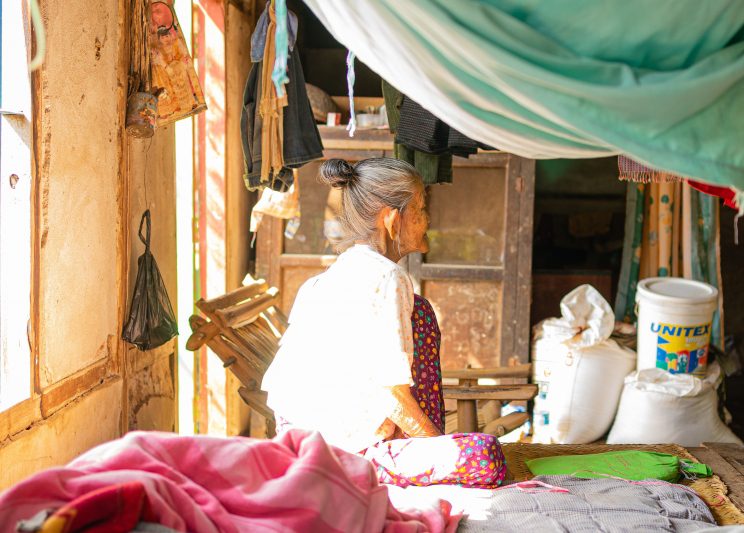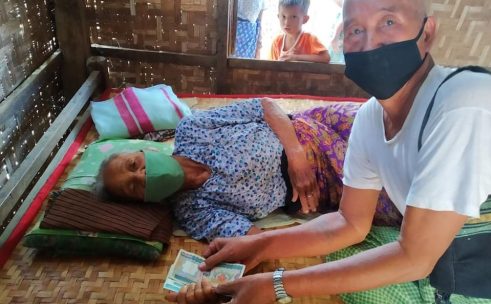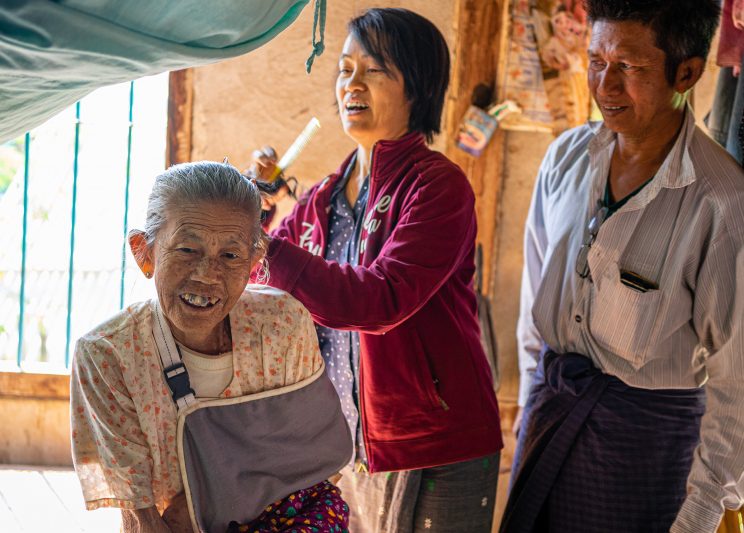One year after the military seized power in Myanmar, we reflect on the impact this had on the nation’s older people and the services we have been able to offer to help mitigate the impacts.
Since the coup, Myanmar’s public health system has largely collapsed, as many healthcare workers have been detained or targeted by the military for their affiliation with the civil disobedience movement.
This meant that when a third wave of COVID-19 struck the country in mid-2021, the country’s pandemic response was in chaos. Hundreds of thousands of people are believed to have died, according to independent media, even though the de facto government states that only 15,000 people lost their lives. This includes many older people who are always most at risk from the pandemic.
Older people have also been put at risk by the increasing violence and attacks on villages by the Myanmar military. While their family members have fled to safety, they are mostly left behind in emergency situations. HelpAge has seen reports of older people being shot, killed, or physically assaulted by Myanmar armed forces.

In one notable incident that took place on June 15, 2021, security forces set fire to a village in Pauk township, in the Magway region, killing an older couple who were unable to flee. This incident was a foreboding of what was going to happen in other parts of the country. It was the first time since the coup that the military had started an offensive against the resistance forces and showcased their brutality.
“Junta soldiers didn’t even spare the 70-year-old lady. They brutally beat her in the violent raid on our village on October 26th,” said a villager from Mandalay’s Amarapura Township.
Many people have also been forced to leave their jobs because of the crisis, forcing them to live without a regular income, while fears rise about the increase in violence. According to the World Bank, Myanmar’s economy shrunk by 18 percent in 2021 and threatens millions with poverty, joblessness, and hunger. The United Nations Development Programmer said that nearly half of the country’s population is expected to be living below the poverty line by early 2022.
Thousands of people have been forced to flee their homes to escape the conflict caused by the coup. According to the UNHCR, fighting between the Myanmar military and ethnic armed forces has led to the displacement of more than 377,800 people (as of January 10) and the need for humanitarian assistance is growing.
HelpAge conducted two rapid needs assessments (RNAs) in April and October 2021 to understand the impact this was having on older people, interviewing 110 older people to find out about the circumstances they were living in.
These assessments found that older people’s needs are increasing in terms of food, (mental) health, income, livelihood, and security. The needs vary highly across the country, but the biggest worries expressed were their ability to make a living and their health, reflecting the disruptions in the economy and public healthcare system.
Our most recent RNA in October 2021 revealed that 85 percent of older people were left with less than one month’s worth of savings, while one in five older people had been forced to skip meals in the last week.
“Food is available in the market, but the price is rising rapidly. So, we use money wisely, like buying cheap food rather than quality food. We usually grow home gardens so there’s no need to worry about vegetables” said an older woman, 92.
Moreover, 38 percent of older people interviewed said that they are unable to access health services and nearly all respondents (97%) said that they were afraid, worried, or stressed.

“In case of a war, how can I carry my husband who is lying in bed? This worries me more than how to fill my stomach,” said an older woman, 66.
Because of the current political instability, commodity prices are rising sharply in Myanmar. This severely impacts older people and people with disabilities, many of whom were already struggling financially.
To ease this hardship, HelpAge has provided financial grants to 5,000 people with disabilities and older people across five townships. Besides cash support, essential food items such as rice and oil have been distributed to older people in selected townships.
Personal protective equipment like facemasks, hand sterilizers, and gloves have also been provided by HelpAge to help protect older people from COVID-19.
Living in an uncertain environment, under constant fear of violence, has left older people with mental health issues – without any support. We have been able to provide mental health and psychosocial support services to older people through homecare volunteers. These volunteers visit older people’s houses and help them with basic daily activities such as showering and cleaning their houses, as well as addressing any fears, worries, or anxiety they may have. The volunteers use the Inter-Agency Standing Committee’s mental health and psychosocial support toolkit for older adults – called “Living with the Times” – as a guide.

Given the virtual collapse of the country’s public healthcare system, HelpAge has been working with communities to identify people at risk in the catchment areas of clinics for non-communicable diseases to deliver screening and referral services. We have been able to offer patients referred for further support, financial support to access private health care facilities.
HelpAge has also been providing training in making soap and hand sanitizers to older people, along with skills development to enable people with disabilities and their household members to earn a livelihood.
“I received hand disinfection gel, face masks, and gloves from HelpAge via our village leader. We use these items based on HelpAge’s COVID-19 information pamphlets. I think that is why we haven’t been infected,’’ U Myint, 60, said.
There are around 5.5 million older people in Myanmar, comprising 10% of the population. The combination of the COVID-19 pandemic and the military coup has increased their need for support, making it difficult for them to access health services or earn a regular income.
This article was originally published by HelpAge International.
